British households use as much as £117 of energy a month in their kitchens alone – with the oven costing the most to run, at over £47 a month.
Research has revealed how much the nation typically forks out for energy costs each month – with two hours and six minutes a day spent using the hob for cooking, costing £32.13 a month.
The poll of 2,000 adults found that they typically have the oven switched on for two hours and 12 minutes a day, with running costs of £47.12 monthly.
And £14.28 a month goes on running the washing machine, for an average of five hours a week – while boiling the kettle, for 11 minutes each day, sets Brits back £5.62 in monthly costs.
Elsewhere in the house, watching TV for four hours a day adds up to £6.12 at the end of a 30-day period, while running an electric shower for 12 minutes a day totals £18.36.

The research, commissioned by EDF, also revealed that almost three-quarters (72%) of those polled are unsure of which appliances use the most electricity in their homes.
For instance, less than three in ten (28%) are aware that their oven is the biggest contributor to electricity bills, based on EDF analysis of UK household’s average appliance use.
Catherine Fowler, energy expert at EDF, said: “Managing household energy usage is more important than ever at the moment – but it can be hard to make savings without first understanding where your biggest spend is.
“For instance, spending 10 minutes less using the oven will save considerably more than the same reduction in use of the microwave – so knowing which appliances use the most energy can help all of us make small changes to be more efficient.
“Even the way we go about our household chores can have a large impact on bills in the long run, so thinking of ways to cut back or swap for more energy efficient routines can be a great first step.
“For example, switching from using the tumble dryer to an airer, or only using the dishwasher when it is full, can go a long way to reducing bills.”
The study also found one in seven (14%) believe broadband routers consume the most energy, despite the appliance only costing £1.39 a month.
It also emerged only a fifth (22%) will use their washing machine most commonly on a 30-degree cycle – despite experts from the Energy Savings Trust advising this could use around 40% less electricity over a year than washing at higher temperatures.
Airing clothes, rather than using the tumble dryer, could also save an average household £50 a year – yet only 36% will consciously avoid using their tumble dryer to save on bills.

It also emerged more than half (52%) have either bought, or considered buying, new gadgets and gizmos in the last 12 months, to help make their home more energy efficient.
These include LED light bulbs, fridges or freezers with a lower EPC rating, and slow cookers – while 30% have jumped on the air fryer band wagon, and are considering or have made a purchase.
The study, conducted via OnePoll, also found six in ten are more aware of their energy consumption now compared to this time last year.
And three-quarters (73%) have cut the use of certain appliances in a bid to scale back their energy consumption – but 59% still find energy efficiency advice confusing.
And only one in ten (12%) have installed a smart meter in the past 12 months, to help manage energy efficiency.
Philippe Commaret, managing director for customers at EDF, added: “We’re committed to supporting our customers through the cost-of-living crisis, and want to help them identify the best ways for them to reduce energy consumption in their homes.
“The good news is that installing a smart meter and using our Energy Hub can help customers understand where they are using the most energy, so that they can make small changes to daily routines that will really help reduce their bills.”
ELECTRICITY USAGE FOR A TYPICAL UK ADULT BY WEEK/DAY, WITH TOTAL MONTHLY COSTS AS A RESULT:
- Oven – 2 hours 12 mins per day – £47.12
- Grill or hob (electric) – 2 hours 6 mins per day – £32.13
- Shower (electric) – 12 mins per day – £18.36
- Washing machine – 5 hours per week – £14.28
- Dishwasher – 4 hours 42 mins per week – £8.63
- TV – 4 hours per day – £6.12
- Kettle – 11 mins per day – £5.61
- PC or desktop computer – 2 hours 18 mins per day – £4.69
- Tumble dryer – 69 mins per week – £3.91
- Games console – 2 hours 30 mins per day – £3.83
- Vacuum cleaner – 3 hours 12 mins per week – £3.70
- Hairdryer – 61 mins per week – £2.77
- Air fryer – 55 mins per week – £2.37
- Iron – 67 mins per week – £2.13
- Toaster – 9 mins per day – £1.76
- Microwave – 11 mins per day – £1.50
- Broadband router – 17 hours per day – £1.39
- Phone charger – 3 hours per day – 31p







